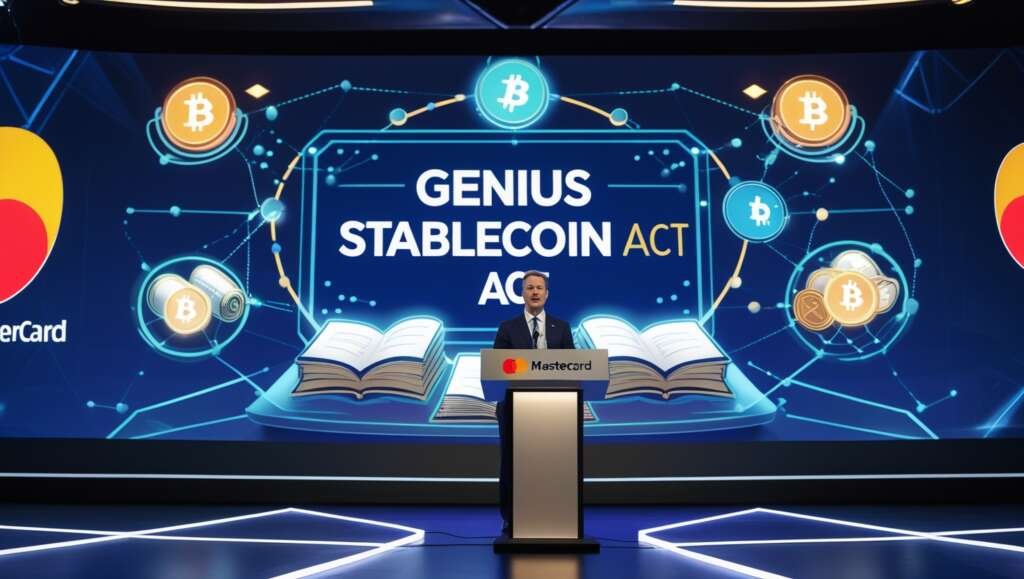President Donald Trump signed the Stablecoin Act into law at the White House. Several institutions embraced the move with open arms, including Mastercard. The global gateway company says the Stablecoin Act is a turning point in the U.S, as it enters into a new era of digital assets.
As the United States steps up its efforts towards regulations with the Stablecoin Act, market watchers believe that cryptocurrency has hit escape velocity. The Stablecoin Act is the first crypto legislation to be signed into law in the United States. With that, the United States joins countries like Singapore, South Korea, and the European nations, under the umbrella of MiCA, with a comprehensive regulatory framework. </span>
Stablecoin Act is Pivotal to Institutional Adoption
Mastercard’s company’s global policy chief, Jesse McWaters, says the Stablecoin Act, also known as the Genius Act, marks a significant shift towards institutional adoption in the United States. McWaters reveals that the passage of the Stablecoin Act points towards a “new era of regulatory clarity and confidence in digital assets.”
The GENIUS Act regulates stablecoin issuance in the United States. It warrants banks, corporations, and other regulated entities to comply with strict reserve and disclosure requirements. The GENIUS Act, after failing to proceed mid-week due to different reasons, was passed with (308 – 122) votes in the House, alongside the CLARITY Bill and the Anti-CBDC Surveillance Bill.
McWaters reveals that Mastercard has waited for this moment, emphasizing the importance of incorporating stablecoins into the financial system. In his opinion, people already trust the traditional financial system, and which is a necessary step to foster adoption.
Read More:
JP Morgan, Others Indicate Interest in Stablecoin
Major players in the traditional finance space have started to show interest in Stablecoin. JP Morgan, Citigroup, and Bank of America are pushing for fractional reserve stablecoins backed by tokenized assets. Currently, a significant portion of stablecoins are fiat-backed. This is inefficient compared to banks, which lend cash to generate profit and still hold a fraction in reserve.
Will Benson, Multiliquid’s founder, opined that banks could have a big advantage if they could issue tokenized dollars, similar to collateralized stablecoins, but only hold a fraction of the reserve against them. The law mandates banks to hold a fraction of their reserve while they lend out deposits to avoid bankruptcy.
Meanwhile, non-banking firms like Apple and Amazon are exploring integrating stablecoins into their platforms. If this works, paying goods and services globally would be easy. Additionally, the platforms will be able to penetrate areas that are heavily unbanked and underbanked.
Critics Warn of Imbalance and Unfairness with the Stablecoin Act
Tether CEO Paolo Ardoino, who was at the White House, said the new law would create a clear regulatory foundation. However, some critics opine that the law could encourage regulatory arbitrage.
In their defence, traditional banks and even big tech companies could have an unfair advantage over typical stablecoin issuers. However, a provision in the Act blocks big tech companies and banks from monopolizing stablecoins, requiring them to obtain special approvals to issue stablecoins. Some Democrats, who opposed the bill, also said it fails to address consumer protection or money laundering risks.
Whether the bill will be amended in the near future to include consumer protection is subjective. Right now, traditional institutions are basking in the passage of the GENIUS Act. They are prepared to take full advantage of it.




